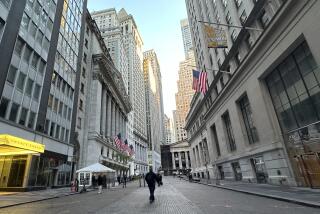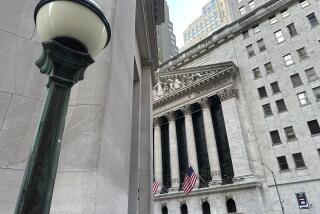U.S. Markets Go Own Way; Dow Up 38.29
Wall Street declared its independence from Japan Monday as U.S. stock prices soared despite the second-largest one-day point decline ever on the Tokyo market.
The Dow Jones index of 30 industrials surged ahead in the final hour of trading to close up 38.29 at 2,602.48, snapping five straight declines. Big Board volume was a moderate 148.9 million shares, only slightly more than the 148.49 million traded Friday.
In the broader market, advancing issues outnumbered declines by about 9 to 7 among stocks trading on the New York Stock Exchange: 822 were up, 639 down and 492 unchanged.
Most analysts were confounded by the market’s resilience after Tokyo’s 225-stock Nikkei index fell 1,569.10, or 4.5%, to close at 33,321.87. The size of the decline was second only to the Nikkei’s drop in the worldwide stock market crash of October, 1987.
Many market analysts had expected Wall Street to follow Tokyo’s lead, as it did last week when the Nikkei index twice fell sharply.
“We’re no longer in lock-step with the Japanese market,” said Paul Hennessey, vice president in trading at Boston Co. “People see some companies they like and are willing to become buyers.”
The Dow’s gain was its biggest since a 47-point jump Jan. 31. Last week, the Dow lost about 2.7% of its value while the Nikkei plummeted 6.9%.
Despite dire predictions that U.S. shares were in for a bruising after the Japanese stock market tumble Monday, prices opened mixed on Wall Street and then pushed ahead steadily through the day.
In addition to bargain hunting, a late round of futures-related buying boosted the Dow more than 21 points in the last hour of trading.
Stock investors also drew strength from the bond market. The price of the bellwether 30-year Treasury bond rose more than half a percentage point.
The Japanese stock market has been in turmoil during the past week amid worries over higher interest rates and inflationary pressures.
Strength in the dollar also helped deflect the shock waves from the Tokyo Stock Exchange.
“The aura of invincibility (of the Japanese market) has been broken,” said Monte Gordon, director of research at Dreyfus Corp.
Boston Co.’s Hennessey, although encouraged by Wall Street’s resilience, said the moderate turnover showed the buying “was not overwhelming. It’s certainly not a tidal wave.”
XTRA Corp. rose 5 1/4 to 30 after the transportation leasing company put itself up for sale.
Federal Express rose 4 1/4 to 51 1/2 on an improved long-term outlook and a rumor of a possible buyout interest from a British carrier.
Caterpillar gained 1 3/8 to 59 1/8. An industry analyst raised his rating on the issue.
Lin Broadcasting rose 2 1/8 to 111 after McCaw Cellular said it has a definitive credit agreement for financing its tender offer for Lin.
United Telecommunications was up 1 3/4 to 34 1/4 on bargain hunting that emerged in response to the stock’s fall last week.
Time Warner edged up 7/8 to 92 3/4. The company said it would buy back about $33 million in common stock.
Saatchi & Saatchi’s American shares fell 5/8 to 7 1/8. The British advertising company said profits are likely to fall short of expectations in the current fiscal year.
Warner-Lambert, which fell sharply Friday on a negative report about its Alzheimer’s drug, rebounded to 103, up 3 1/4.
CREDIT Stocks, Dollar Gains Boost Bond Market Bond prices rose in active trading, buoyed by the dollar’s strength against other currencies and a robust performance in the U.S. stock market.
The Treasury’s closely watched 30-year bond jumped about 5/8 point, or $6.25 for every $1,000 in face value. Its yield tumbled to 8.48% from 8.55% late Friday.
Despite uneasiness about the selloff in Tokyo, investors refrained from dumping stocks in the United States.
“It was a confidence builder that the United States does not have to play ‘follow the leader,’ ” one analyst said. He said the stock advance bolstered the sentiment that U.S. interest rates could ease in the near future.
Last week, when Wall Street was stuck in its losing streak, sharp declines in stock prices had boosted bond prices as investors moved funds into the relatively safe haven of U.S. Treasury securities
The Shearson Lehman Hutton daily Treasury bond index, which measures price movements on all outstanding Treasury issues with maturities of a year or longer, rose 3.77 to 1,158.55.
In the tax-exempt market, the Bond Buyer index of 40 actively traded municipal bonds closed at 92, up 3/16 of a point. The average yield to maturity declined to 7.40% from 7.42% late Friday.
In the secondary market for short-term Treasury securities already in circulation, yields on three-month bills rose to 7.94% as the discount jumped 4 basis points to 7.71%. Yields on six-month bills declined to 8.06% as the discount slipped 1 basis point to 7.66%. Yields on one-year bills fell to 8.07% as the discount lost 4 basis points to 7.52%.
A basis point is one-hundredth of a percentage point. The yield is the annualized return on an investment in a Treasury bill. The discount is the percentage that bills are selling below the face value, which is paid at maturity.
The federal funds rate, the interest rate banks charge each other on overnight loans, was quoted at 8.25%, unchanged from Friday.
CURRENCY Dollar Hits 8-Month High Against Yen The dollar closed at an eight-month high against the Japanese yen as investors bailed out of the Tokyo stock market and converted their yen holdings into dollars.
With the dollar soaring, the Federal Reserve Board intervened in the foreign exchange market to stem its rise, augmenting massive intervention by the Bank of Japan in Tokyo.
While the intervention tempered the dollar’s ascent, it did little to change overall bullish sentiment toward the U.S. currency.
“Basically, we still like the dollar,” said chief dealer Dan Brooks at the Dai-Ichi Kangyo Bank. “In the long term, we see the yen weak against the dollar.”
In Tokyo, the dollar closed at 148.65 Japanese yen, up from 146.47 Friday. Later, in London, it rose to 148.80 yen. In New York, the dollar rose to 148.63 yen from 147.07.
The dollar gained ground against the British pound. In London, the pound fell to $1.6927 from $1.7090 late Friday. In New York, the pound fell to $1.6903 from $1.7092.
As a result of the weakness in Japan’s stock and bond prices, “the Bank of Japan is caught between a rock and a hard place,” said Diego Giurleo, corporate foreign exchange manager for Royal Bank of Canada in New York.
More to Read
Inside the business of entertainment
The Wide Shot brings you news, analysis and insights on everything from streaming wars to production — and what it all means for the future.
You may occasionally receive promotional content from the Los Angeles Times.










